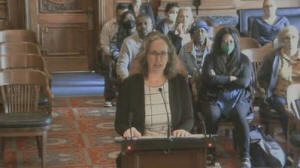Illinois Supreme Court to determine if man was wrongfully convicted
 Send a link to a friend
Send a link to a friend
 [September 13, 2023]
By Andrew Hensel | The Center Square [September 13, 2023]
By Andrew Hensel | The Center Square
(The Center Square) – The Illinois Supreme Court on Tuesday heard from a
man's lawyers who said their client was wrongfully detained in prison
for 25 years due to a confession that was given after being tortured.
Darrell Fair has been incarcerated since 1998 after being convicted of a
fatal shooting. The defendant alleges that police officer Jon Burge beat
a confession out of him after 30 hours of interrogation.
Fair claims he was denied his asthma inhaler and access to a lawyer, was
physically kicked and was not allowed to sleep during his interrogation.
Burge was later fired from the Chicago Police Department in 1993 after a
series of allegations of torture-induced confessions of criminal
suspects.
Fair's case made its way to Illinois' highest court on Tuesday, where
Fair's lawyer, Debra Loevy, said the evidence shows no involvement from
her client.

"It [his confession] was made after 30 hours plus of interrogation after
two gun threats, after former detective McDermott's violent assault on
Mr. Fair's knee, after a denial of asthma medicine and food, the right
to council despite repeated requests," Loevy said. "No witness in any
proceeding has ever denied any of these allegations or the outcry about
them."
Loevy argued that when looking at the facts in the case, it is clear
that what happened to Fair was in violation of the state's Torture Act.
[to top of second column]
|

Debra Loevy, attorney for Darrell Fair, before the Illinois Supreme
Court Tuesday - BlueRoomStream

"He knew his will was overborn. He was coerced," Loevy said. "To try and
separate out which of those different things is torture, I think, defies
the purpose of what this act is."
The state argued that the plaintiffs were arguing two different
viewpoints.
"The question is, what are we looking at the totality of circumstances
to determine? Are we looking at all the circumstances to determine was
this statement voluntary? Or are we looking at all of the circumstances
to determine was this statement torture," said Illinois Assistant
Attorney General Josh Schneider.
Schneider said the definition of torture does not meet the standards of
Fair's claims.
"The difference between torture and coercion is one of severity,"
Schneider said. "A person can be coerced by being threatened."
Fair hopes to have his conviction reversed and have his statements
omitted.
 |